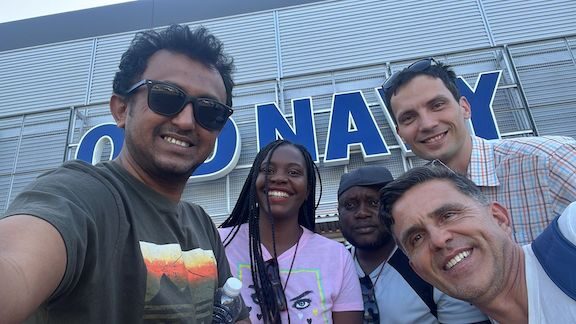Eighteen unique and different researchers from around the world meet in Cronkite Room 444 daily to learn, discuss, understand, and, most importantly, to know. Today was not just about learning, it was about collaboration and cooperation.
Today we were divided into small groups to aid and assist each other in our projects; what was enlightening about the experience was the knowledge I gained from speaking to each one.
As each member presented their project, it added something to me: a new concept, a piece of information, or even shed light on a part of the world I know nothing about.
Carmem from Brazil introduced me to the difference between module and course, and she explained to me her project that focuses on international cases from all over the world in a module she is seeking to develop under the title of “Media and Global Agenda.” And what better place to get an international perspective than from the people in Cronkite Room 444?
Elastus, from Zambia, represents most of us in terms of having too many ideas. Still, each one is an important project to pursue, from developing a course that tackles media literacy concerning misinformation to organizing a Tech Camp to empower Journalists’ capabilities and skills to face insistent challenges through technology.

In the south, by the northern Indian Ocean, lies Bangladesh. Rakib introduced me to the DSA (Digital Security Act) enacted in 2018, which was criticized for its vagueness in defining different categories of speech, and which has since negatively influenced freedom of speech.
On the same subcontinent, Rachna from India walked me from the digital laws and regulations governing digital platforms to developing a new course focusing on India-centric challenges regarding media literacy. Rachna introduced me to the concept of prosumers, referring to shifting audience roles: nowadays, the audience has evolved from consumers of content on social media platforms to producer/consumers with their own voices and side of the story to tell.
On the border of India lies Myanmar. Myat described the 2021 coup d’état and how disinformation played a vital role in fueling it, with a parallel battle taking place on social media. Her research project aims to analyze disinformation on Facebook following the coup d’état.
In South America we find Suriname, with a population of 620.4 thousand (as of January 2023). According to Unicef, 85% of children there complete primary education, but completion rates drop sharply at higher levels of education, with only 23% of all children finishing their secondary education. This was Angela’s main drive to suggest developing a public relations lab to help students gain real-life experience and assist the community by fostering a positive, cooperative relationship between the academic institution and the people.
A.I. was one of the main topics on the agenda of projects discussed today, and how it will affect people working in different areas. There were two points of view on the subject. The first suggested that it will impact the human workforce by eventually replacing workers; on the other side, the main argument was that people will benefit from it. Hassan from Lebanon will answer part of this dilemma through his project, which focuses on the relationship between A.I. and public relations.
As media plays a vital role in shaping our perception of reality and safety, Anida from Bosnia Herzegovina sheds light on the concept of constructive Journalism, which aims to provide audiences with an impartial, precise and contextualised picture rather than focusing on the negative aspects in the news media. This type of journalism is about looking for solutions to problems as well as exposing them.
Brilliant ideas have been discussed, modified and developed, from Europe to South America, from Asia to Africa. These projects inspire me to be more open to the world and understand that if we want to solve a problem, we have to stick together and cooperate because we can do so little alone, but together we can solve it all.

